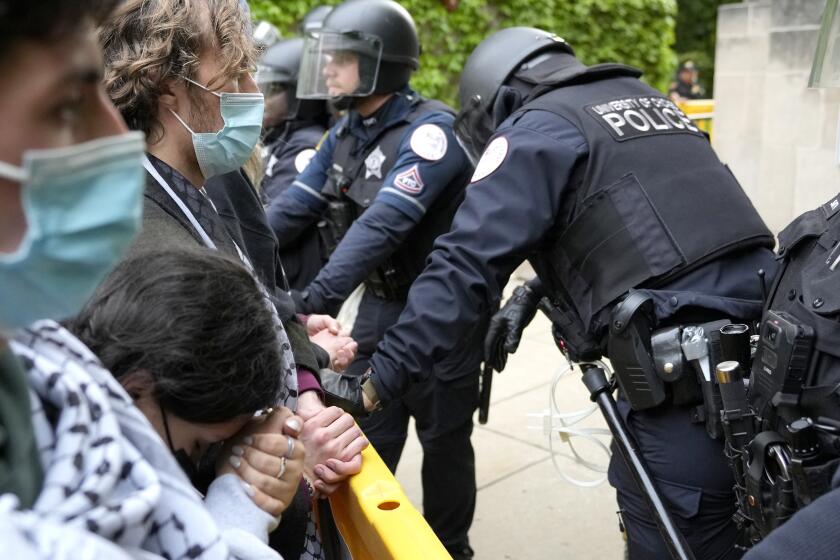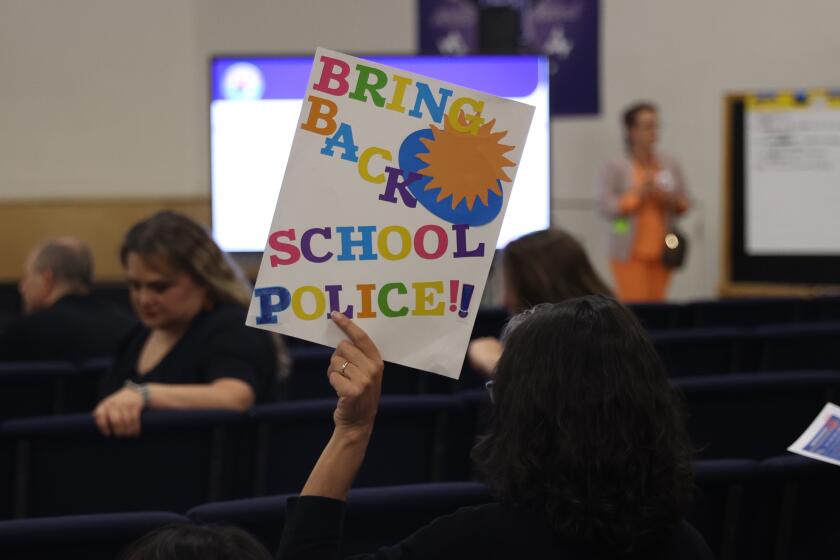A Bilingual-Education Initiative as a Prop. 187 in Disguise?
Bilingual education is back in the news. The Orange Unified School Board has voted unanimously to seek permission from the state to terminate its bilingual education program and replace it with English immersion. Ruben Zacarias, superintendent of the L.A. Unified School District, wants to limit the number of years a student remains on a bilingual track. And new polling data suggest that a majority of Latino parents, notably in Orange County, are worried that their children will become mired in bilingual education; they strongly believe in early English proficiency. Come June 1998, all California may be pulled into the bilingual fray if the English Language Education for Immigrant Children Initiative qualifies for the ballot.
At first glance, the measure appears to be the latest embodiment of the sort of anti-immigrant and anti-Latino prejudice enshrined in Proposition 187. But that oversimplification may mischaracterize the proposed initiative as harmful, when it may be helpful.
The initiative would require that all students be placed in English-language classrooms; provide students classified as “English learners” (limited English proficient in current parlance) with a one-year transition period of “sheltered immersion,” in which instruction is in English but the curriculum and presentation are designed for non-English speakers; allow students’ parents, under certain conditions, to opt for bilingual education, and annually appropriate $50 million for English-language instruction classes for parents who pledge to provide students with “English language tutoring.”
The initiative, sponsored by former gubernatorial candidate Ron Unz and teacher Gloria Matta Tuchman, is based on a number of suppositions. One, that bilingual education has failed. Two, that school bureaucracies addicted to the additional funding provided for bilingual students ignore complaints of parents who want their children taught in English. And, finally, since schools have shirked their “moral obligation” to leave students with the skills necessary to be successful, including English proficiency, more power should be returned to parents.
The English for the Children initiative will no doubt run afoul of extremists on both right and left. Cultural purists, nativists and those resentful of financing bilingual education in California will balk at either the prospect of paying an additional $50 million to teach English to parents or the idea of allowing those parents to opt for bilingual education. The pro-bilingual crowd, on the other hand, will bristle at the idea of putting all children in English-language classrooms and will, on the heels of Propositions 187 and 209, decry the initiative as the third assault in as many elections on California’s growing Latino population.
One wild card in all this will be younger Mexican Americans. They opposed Proposition 187 because it blocked access to education. They were conflicted over Proposition 209 because it seemed to both limit opportunity and reward merit. On bilingual education, how will they line up? For the MTV generation, at ease with English, there are no historical scars, no romantic connection to bilingual education as rectifier of linguistic wrongs, no hang-ups over “the way it used to be” in public schools, no hostility toward English and no reluctance to scrutinize the motivations of interest groups. Within a generation that struggles with Spanish and answers its Mexican abuelita’s questions in English, it may prove difficult to whip up hysteria over an end to government-subsidized bilingualism.
Along the way, these young, more open-minded Mexican Americans may be joined by immigrant parents. Early last year, at the Ninth Street School in downtown Los Angeles, where nine of 10 students do not speak English and where only 1% of students master enough English to test out of the bilingual program, dozens of parents, calling themselves Las Familias del Pueblo, revolted against bilingual education, demanding that the school eliminate it and re-emphasize learning English. School officials dismissed their wishes.
A few months later, a survey of 600 Latino parents, by the Washington-based Center for Equal Opportunity, found that 81.3% preferred that their children’s courses be taught in English, while only 12.2% chose Spanish. Those figures are consistent with a 1988 Department of Education study, which revealed that 78% of Mexican parents opposed teaching language-minority children in a non-English language if “it meant less time teaching them English.” They also mesh with more recent findings in a Los Angeles Times poll, which found that 83% of Latino parents in Orange County favor English-language instruction as soon as their children begin school, while only 17% support native-language instruction.
Presented with such figures, school officials and defenders of bilingual education have, up to now, held their ground, contending that parents are “uninformed” and “misguided” and asserting that schools know how best to educate their children.
This old refrain hearkens back to 1968, at the height of the modern Chicano Movement. That was also the year that Congress pushed through the Bilingual Education Act--and sparked 30 years of intermittent debate. It was also the year when thousands of Mexican American students, protesting what they considered to be an inferior education designed by mostly white school officials, walked out of five high schools in the L.A. Unified School District. At school board meetings, the students’ parents rose and spoke in support of their children. The school officials’ response: They knew better.
That story is a poignant reminder of just how far those who profess to advocate for Latinos have, in 30 years, strayed from their own ideals. Today, advocacy groups, in circling the wagons to preserve besieged programs like bilingual education, no longer ask themselves tough questions about whether such programs are worth preserving in the first place. As a result, Latino parents who have taken a stand against bilingual education have stood alone, at odds with the very groups that are supposed to be their champions.
Meanwhile, the national education system claims, from the beginning, to have used bilingual education to give non-English-speaking students a voice. How ironic that now, in ignoring growing opposition to the program, that same system should deny a voice to their parents.
More to Read
Start your day right
Sign up for Essential California for news, features and recommendations from the L.A. Times and beyond in your inbox six days a week.
You may occasionally receive promotional content from the Los Angeles Times.






